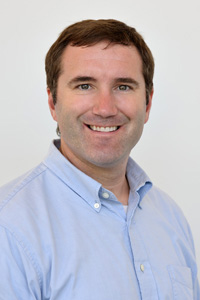 Assistant Professor of Biochemistry and Biomedical Engineering
Assistant Professor of Biochemistry and Biomedical Engineering
michael-schnieders@uiowa.edu
(319) 335-7891
Biography
Michael Schnieders earned undergraduate and doctoral degrees in Biomedical Engineering from The University of Iowa and Washington University in St. Louis, respectively. Following postdoctoral work at Stanford University in the area of biomolecular X-ray crystallography and at The University of Texas at Austin in the area of protein-drug interactions, he returned to The University of Iowa as a joint faculty member in the Departments of Biomedical Engineering and Biochemistry.
Research Interest(s)
Dr. Schnieders' research is focused on understanding inherited diseases by using computational molecular biophysics theory and high performance computational algorithms to map genetic information onto molecular phenotypes. Technological problems addressed include 1) formulation of physics based theories of protein structure and function 2) incorporation of these theories into high performance computer codes 3) validation of simulation methods against experiment and 4) application of the resulting technology to disease genes. In particular, he applies this technology to help answer fundamental questions about the causes of inherited eye diseases, inherited deafness and inherited metabolic disorders.
Selected Publications
Schnieders, M. J., Baker, N. A., Ren, P., and Ponder, J. W. (2007) Polarizable atomic multipole solutes in a Poisson-Boltzmann continuum, Journal of Chemical Physics 126, 1-21.
Schnieders, M. J., and Ponder, J. W. (2007) Polarizable atomic multipole solutes in a generalized Kirkwood continuum, Journal of Chemical Theory and Computation 3, 2083-2097.
Schnieders, M. J., Fenn, T. D., Pande, V. S., and Brunger, A. T. (2009) Polarizable atomic multipole X-ray refinement: Application to peptide crystals, Acta Crystallographica Section D 65, 952-965.
Fenn, T. D., Schnieders, M. J., and Brunger, A. T. (2010) A smooth and differentiable bulk-solvent model for macromolecular diffraction, Acta Crystallographica Section D 66, 1024-1031.
Fenn, T. D., Schnieders, M. J., Brunger, A. T., and Pande, V. S. (2010) Polarizable atomic multipole X-ray refinement: hydration geometry and application to macromolecules, Biophysical Journal 98, 2984-2992.
Ponder, J. W., Wu, C., Ren, P., Pande, V. S., Chodera, J. D., Schnieders, M. J., Haque, I., Mobley, D. L., Lambrecht, D. S., DiStasio, R. A., Head-Gordon, M., Clark, G. N. I., Johnson, M. E., and Head-Gordon, T. (2010) Current status of the AMOEBA polarizable force field, Journal of Physical Chemistry B 114, 2549- 2564.
Fenn, T. D., and Schnieders, M. J. (2011) Polarizable atomic multipole X-ray refinement: weighting schemes for macromolecular diffraction, Acta Crystallographica Section D 67, 957-965.
Fenn, T. D., Schnieders, M. J., Mustyakimov, M., Wu, C., Langan, P., Pande, V.S., and Brunger, A. T. (2011) Reintroducing electrostatics into macromolecular crystallographic refinement: application to neutron crystallography and DNA hydration, Structure 19, 523-533.
MacCallum, J. L., Pérez, A., Schnieders, M. J., Hua, L., Jacobson, M. P., and Dill, K. A. (2011) Assessment of protein structure refinement in CASP9, Proteins: Structure, Function, and Bioinformatics 79, 74-90.
Schnieders, M. J., Fenn, T. D., and Pande, V. S. (2011) Polarizable atomic multipole X-ray refinement: Particle mesh Ewald electrostatics for macromolecular crystals, Journal of Chemical Theory and Computation 7, 1141- 1156.
Schnieders, M. J., Kaoud, T. S., Yan, C., Dalby, K. N., and Ren, P. (2012) Computational insights for the discovery of non-ATP competitive inhibitors of MAP kinases, Current Pharmaceutical Design 18, 1173-1185.
Schnieders, M. J., Baltrusaitis, J., Shi, Y., Chattree, G., Zheng, L., Yang, W., and Ren, P. (2012) The Structure, Thermodynamics, and Solubility of Organic Crystals from Simulation with a Polarizable Force Field, Journal of Chemical Theory and Computation 8, 1721-1736.
 Assistant Professor of Biochemistry and Biomedical Engineering
Assistant Professor of Biochemistry and Biomedical Engineering